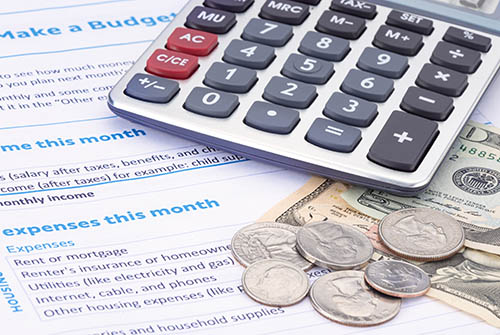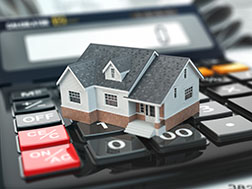 Buying a home is a significant expense. It doesn’t matter whether you’re a first-time buyer or have experience. Unless you have a large pile of cash, you’ll need to ensure your finances are in order before closing. In this post we’ll explore four financial items you’ll want to check off before buying a new home.
Buying a home is a significant expense. It doesn’t matter whether you’re a first-time buyer or have experience. Unless you have a large pile of cash, you’ll need to ensure your finances are in order before closing. In this post we’ll explore four financial items you’ll want to check off before buying a new home.
Figure Out Your Current Monthly Budget
First, you’re going to want to sort out your monthly budget. If you’ve never done a budget before, start with something basic. Open up a spreadsheet or take out a piece of paper. Make two columns: ‘income’ and ‘expenses’. Fill in each column with the amounts that you make or spend each month. Bank, credit card and other statements can help with this process. It’s a good idea to go back at least 3 months to ensure you’re capturing your true spending.
Make A Debt Management Plan
Do you have any debts? If so, you’ll want to make a plan for how you’re going to manage these when you buy a new home. For example, you may have a car payment, student loans, a line of credit or credit card debt. Write down your debts, how much you owe and when payments are due. If any debts are due monthly, make sure you include those in your budget.
Keep in mind that your outstanding debts may impact your ability to borrow for a mortgage as well. If you plan on taking out a mortgage to pay for your new home, it’s best to get your debts figured out beforehand.
Understand All Your Real Estate Costs
Next, you’ll want to determine what all your real estate costs are going to be. If you’re not yet close to the bidding or closing process, this might be a bit challenging. But ask your real estate agent for a breakdown of what you can expect to pay for a home in your price range.
Set Up An Emergency Savings Cushion
Finally, you’ll want to set up a financial cushion in case of emergencies. It’s not much fun to think about, but losing a job or having a health event is possible. Most financial experts recommend having at least six months of expenses saved up. Of course, this is always easier said than done. What’s important is that you have at least some cash tucked away, just in case. If you can, save a bit extra each month or from each pay check and add to this emergency fund.
When you’re ready to buy a new home, a professional mortgage agent is your best bet for success. Reach out to us today and learn more about how affordable a new home in your community will be!

 The burden of debt, especially when it comes to the high price tag of a home, can be a significant worry to many people. However, what many homeowners may not be aware of is that paying your mortgage off early can actually have a negative impact on your financial health. Whether you’ve recently come into money or you’re working hard to bump up your monthly mortgage payments, here are some reasons you may want to hold off on paying it off too quickly.
The burden of debt, especially when it comes to the high price tag of a home, can be a significant worry to many people. However, what many homeowners may not be aware of is that paying your mortgage off early can actually have a negative impact on your financial health. Whether you’ve recently come into money or you’re working hard to bump up your monthly mortgage payments, here are some reasons you may want to hold off on paying it off too quickly. There’s a lot of flexibility and personal freedom associated with self-employment that can be a great benefit to your lifestyle and your pocketbook. However, because of the somewhat unpredictable nature of self-employment, it can make acquiring a mortgage a little more difficult. If you’ve recently become self-employed or have been in the game for a while, here are some things you may want to consider before submitting your mortgage application.
There’s a lot of flexibility and personal freedom associated with self-employment that can be a great benefit to your lifestyle and your pocketbook. However, because of the somewhat unpredictable nature of self-employment, it can make acquiring a mortgage a little more difficult. If you’ve recently become self-employed or have been in the game for a while, here are some things you may want to consider before submitting your mortgage application. From the approaching holiday season to the New Year, there are a lot of things to prepare for when it comes to the winter. It’s important, though, not to forget about the needs of your lawn for the upcoming cold season. If you’re wondering how to ready your trees, your plants and your yard, here are some tips for saving your vegetation until the springtime.
From the approaching holiday season to the New Year, there are a lot of things to prepare for when it comes to the winter. It’s important, though, not to forget about the needs of your lawn for the upcoming cold season. If you’re wondering how to ready your trees, your plants and your yard, here are some tips for saving your vegetation until the springtime. As 2017 winds down, analysts are forecasting economic developments for 2017. Forbes identified three indicators that the U.S. housing market has recovered. Mortgage rates rose again last week; jobless claims fell and consumer sentiment jumped rose five points. The details:
As 2017 winds down, analysts are forecasting economic developments for 2017. Forbes identified three indicators that the U.S. housing market has recovered. Mortgage rates rose again last week; jobless claims fell and consumer sentiment jumped rose five points. The details: